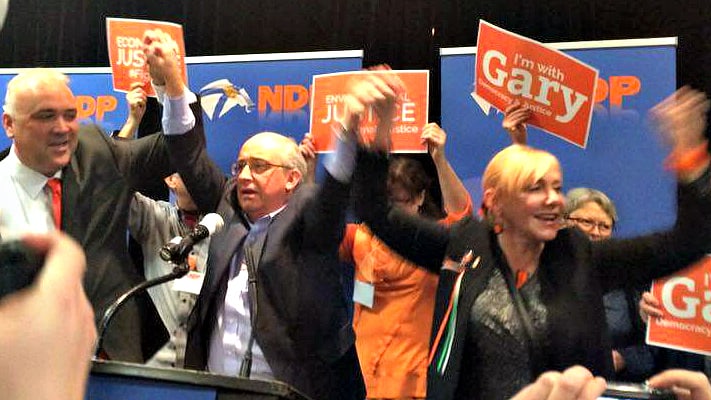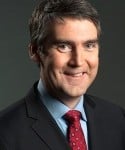
Gary Burrill wins NDP leadership 2016. (Danielle Cameron, The Signal)
Cast your mind back to October 9, 2013. The morning after the night before.

Darrel Dexter (Halifax Metro)
Nova Scotia’s first ever NDP government had just morphed into Nova Scotia’s first one-term government in more than 130 years. The party that began its re-election campaign with 31 of 52 legislature seats hobbled across the finish line with seven shell-shocked MLAs. Even the party’s once do-no-wrong leader, Darrell Dexter, lost his premier’s position and his legislative seat…
Anyone surveying that NDP carnage, who would have dared suggest the party could not merely recover from its existential debacle but be poised to challenge again for power before the next general election, would have — rightly — been dismissed as delusional.
That may still be true.
But today — following last weekend’s choice of Gary Burrill as the new NDP leader — it is at least possible for party members to dream again.
It doesn’t begin with Burrill.

Stephen McNeil
It begins with Stephen McNeil. During their first two and a half years in office, McNeil’s Liberals have botched their way through too many crises of their own creation. The film tax credit, seniors pharmacare… They’ve arbitrarily slashed budgets for do-good groups that help the province’s most vulnerable, bumbled post-secondary education funding, alienated teachers, nurses and public servants and further mismanaged already mismanaged NDP files like the Yarmouth ferry.
They’ve done it in the name of the great god of balanced budgets, believing they can cut their way to prosperity — and re-election. The problem is austerity doesn’t work, except for those at the top. And the pendulum of public opinion has finally begun to swing away from a generation of McNeil-embraced failed neoliberal policies.
Justin Trudeau, for example, owes his electoral success, in part, to his damn-the-deficits promise to invest in infrastructure. Bernie Sanders has tapped an equally rich vein of American voter frustration by challenging prevailing economic orthodoxy.
McNeil? His poll numbers have been artificially fluffed up because Jamie Baillie’s Harper-Conservative fiscal policies have failed to generate electoral traction while the NDP has not had a permanent leader for more than two years.
Gary Burrill — though still little known outside inside NDP circles — seems like a thoughtful progressive who embraces what he calls “social investment” in the economy: “livable incomes” for all, publicly funded post-secondary education, fairer taxation.
Which means we may have a real choice next time around.
That would be refreshing.



 STEPHEN KIMBER, a Professor of Journalism at the University of King's College in Halifax and co-founder of its MFA in Creative Nonfiction Program, is an award-winning writer, editor and broadcaster. He is the author of two novels and eight non-fiction books. Buy his books
STEPHEN KIMBER, a Professor of Journalism at the University of King's College in Halifax and co-founder of its MFA in Creative Nonfiction Program, is an award-winning writer, editor and broadcaster. He is the author of two novels and eight non-fiction books. Buy his books